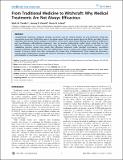From traditional medicine to witchcraft : why medical treatments are not always efficacious
Abstract
Complementary medicines, traditional remedies and home cures for medical ailments are used extensively world-wide, representing more than US$60 billion sales in the global market. With serious doubts about the efficacy and safety of many treatments, the industry remains steeped in controversy. Little is known about factors affecting the prevalence of efficacious and non-efficacious self-medicative treatments. Here we develop mathematical models which reveal that the most efficacious treatments are not necessarily those most likely to spread. Indeed, purely superstitious remedies, or even maladaptive practices, spread more readily than efficacious treatments under specified circumstances. Low-efficacy practices sometimes spread because their very ineffectiveness results in longer, more salient demonstration and a larger number of converts, which more than compensates for greater rates of abandonment. These models also illuminate a broader range of phenomena, including the spread of innovations, medical treatment of animals, foraging behaviour, and self-medication in non-human primates.
Citation
Tanaka , M M , Kendal , J R & Laland , K N 2009 , ' From traditional medicine to witchcraft : why medical treatments are not always efficacious ' , PLoS ONE , vol. 4 , no. 3 , e5192 . https://doi.org/10.1371/journal.pone.0005192
Publication
PLoS ONE
Status
Peer reviewed
ISSN
1932-6203Type
Journal article
Description
The work was supported by the Research Councils UK, Biotechnology and Biological Sciences Research Council UK and the European Union. The funders had no role in study design, data collection and analysis, decision to publish, or preparation of the manuscript.Collections
Items in the St Andrews Research Repository are protected by copyright, with all rights reserved, unless otherwise indicated.

